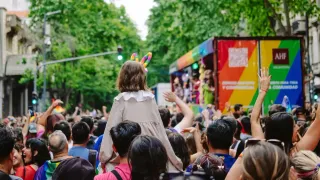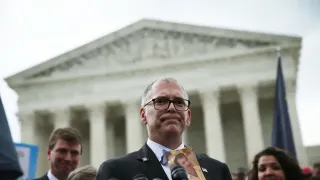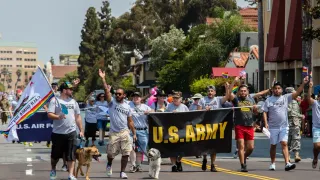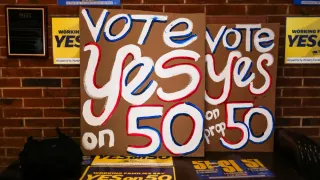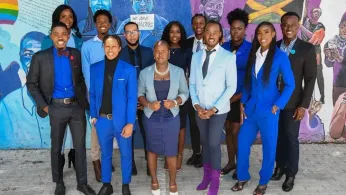
5 hours ago
Jamaica's LGBTQ Community Mobilizes for Hurricane Melissa Relief Amid Crisis
READ TIME: 4 MIN.
On October 28, 2025, Hurricane Melissa, a Category 5 storm with sustained winds of 185 mph, made landfall in Jamaica’s Westmoreland Parish, unleashing catastrophic destruction across the island. The storm claimed at least 28 lives in Jamaica, with further fatalities reported in Haiti and the Dominican Republic. Damage to homes, infrastructure, and public services has left thousands displaced and in urgent need of basic necessities such as food, water, and shelter .
While the hurricane’s devastation was widespread, LGBTQ individuals in Jamaica have faced unique and severe challenges. According to the Equality for All Foundation Jamaica, LGBTQ Jamaicans are more likely to experience homelessness, displacement, and discrimination—even in the wake of natural disasters. The organization notes that “one in three has experienced homelessness or displacement” and that “over a third report they would avoid emergency aid” due to fear of discrimination or prior negative experiences with public services .
Jamaica remains one of the countries where consensual same-sex sexual relations are criminalized, and violence and discrimination based on sexual orientation and gender identity are widespread. This has led to a situation in which LGBTQ Jamaicans are often excluded from government-led relief efforts and face additional barriers in securing safe shelter and essential resources during crises .
In response to these urgent needs, the Equality for All Foundation Jamaica has partnered with the Rustin Fund for Global Equality to launch the Hurricane Melissa Relief Fund. The initiative aims to provide emergency housing, transportation, basic essentials, and support for rebuilding to LGBTQ Jamaicans most affected by the disaster. The fund also seeks to address longer-term needs for those who may face extended displacement or ongoing vulnerability due to their marginalized status .
Craig Rijkaard, a member of the Rustin Fund’s board of directors, emphasized the compounded vulnerability of LGBTQ Jamaicans in a public statement: “LGBTQI+ Jamaicans are especially vulnerable, as one in three has experienced homelessness or displacement. Unfortunately, government-led relief efforts do not always work well for our communities, as many LGBTQI+ Jamaicans are afraid to access public services due to fear and the lived reality of discrimination” .
The need for targeted relief for LGBTQ Jamaicans is underscored by persistent legal and social barriers. Despite international appeals for inclusive disaster response, many LGBTQ individuals avoid state-run shelters out of fear for their safety, or are outright denied access. Reports from advocacy groups and international human rights organizations consistently highlight that LGBTQ people in Jamaica are frequently subject to harassment, violence, and exclusion, particularly in emergency situations where privacy and security are already compromised .
The Equality for All Foundation Jamaica’s relief efforts are designed to bypass these barriers by providing direct, confidential support to those in need. The organization has called for both financial contributions and in-kind donations from the global community, emphasizing that the needs of LGBTQ Jamaicans are acute and often overlooked by mainstream relief agencies .
This crisis has drawn renewed attention to the broader struggle for LGBTQ rights and safety in Jamaica. Local and international LGBTQ organizations, including the National LGBT Media Association and Human Rights Watch, have called on the Jamaican government and international relief agencies to ensure that disaster response plans are inclusive of sexual and gender minorities. They argue that access to safe shelter, medical care, and basic necessities should be guaranteed for all, regardless of sexual orientation or gender identity .
The intersection of natural disaster and social marginalization highlights the urgent need for both immediate humanitarian aid and long-term policy change. Advocates stress that supporting LGBTQ businesses and organizations on the ground is essential not only for disaster relief, but also for building resilience within marginalized communities.
The Hurricane Melissa Relief Fund has received support from LGBTQ advocates internationally, with diaspora organizations and allies mobilizing donations and supplies. The Rustin Fund for Global Equality, a U.S.-based organization with a long history of supporting LGBTQ rights globally, has played a pivotal role in amplifying the call for aid and ensuring accountability in the distribution of resources .
In addition to financial support, international partners have advocated for policy reforms that would better protect LGBTQ Jamaicans in future crises. This includes urging the Jamaican government to repeal laws criminalizing same-sex relations and to enact anti-discrimination protections, as well as encouraging international donors to tie humanitarian aid to the implementation of inclusive policies .
Amid the devastation, personal stories from LGBTQ Jamaicans underscore the importance of community-based relief. Many individuals report fleeing unsafe homes or neighborhoods during the hurricane, only to face further insecurity in temporary shelters. “I was afraid to go to a shelter because of what happened to my friend last year. She was outed and attacked,” shared one survivor in a statement collected by the Equality for All Foundation Jamaica .
Others describe the vital support provided by LGBTQ organizations: “They brought food and blankets when no one else would help us. Without them, I don’t know what we would have done,” said another recipient of the relief fund .
As the immediate crisis recedes, the long-term task of rebuilding homes, businesses, and lives remains daunting. The Equality for All Foundation Jamaica is committed to ongoing support, including legal assistance, housing advocacy, and mental health services for those impacted by the hurricane. The organization is also working with other civil society groups to monitor the distribution of aid and to ensure that LGBTQ voices are included in recovery planning .
The events following Hurricane Melissa serve as a stark reminder of the vulnerabilities faced by LGBTQ communities in disaster zones, particularly in regions where legal and social discrimination is entrenched. They also highlight the power of grassroots organizations and international solidarity in meeting urgent needs and advocating for a more inclusive future.
